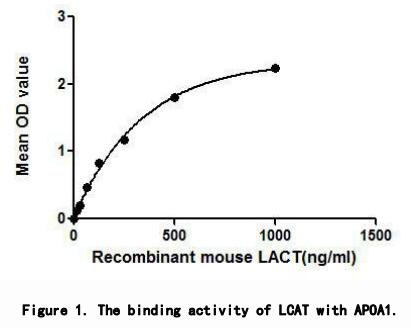Active Lecithin Cholesterol Acyltransferase (LCAT)
phosphatidylcholine-sterol O-acyltransferase; Phospholipid-cholesterol acyltransferase
- Product No.APJ516Mu01
- Organism SpeciesMus musculus (Mouse) Same name, Different species.
- Buffer FormulationPBS, pH7.4, containing 0.01% SKL, 1mM DTT, 5% Trehalose and Proclin300.
- TraitsFreeze-dried powder
- Purity> 90%
- Isoelectric Point6.3
- ApplicationsCell culture; Activity Assays.
- Download Instruction Manual
- UOM 10µg50µg 200µg 1mg 5mg
-
FOB
US$ 320
For more details, please contact local distributors!US$ 800
For more details, please contact local distributors! US$ 1600
For more details, please contact local distributors! US$ 4800
For more details, please contact local distributors! US$ 12000
For more details, please contact local distributors!
ACTIVITY TEST of the Active Lecithin Cholesterol Acyltransferase (LCAT)

LCAT (Phosphatidylcholine-sterol acyltransferase) is an enzyme in the extracellular metabolism of plasma lipoproteins, which converts cholesterol and phosphatidylcholines (lecithins) to cholesteryl esters and lysophosphatidylcholines. It is reported that APOA1 (Apolipoprotein A-I) acts as a cofactor for the LCAT. Thus, a binding ELISA assay was conducted to detect the association of LCAT with APOA1. Briefly, recombinant rat LCAT were diluted serially in PBS with 0.01% BSA (pH 7.4). Duplicate samples of 100uL were then transferred to APOA1-coated microtiter wells and incubated for 2h at 37°C. Wells were washed with PBST and incubated for 1h with anti-LCAT pAb, then aspirated and washed 3 times. After incubation with HRP labelled secondary antibody, wells were aspirated and washed 3 times. With the addition of substrate solution, wells were incubated 15-25 minutes at 37°C. Finally, add 50µL stop solution to the wells and read at 450nm immediately. The binding activity of LCAT with APOA1 was shown in Figure 1 and this effect was in a dose dependent manner.
USAGE of the Active Lecithin Cholesterol Acyltransferase (LCAT)
Reconstitute in 20mM Tris, 150mM NaCl (pH8.0) to a concentration of 0.1-1.0 mg/mL. Do not vortex.
STORAGE of the Active Lecithin Cholesterol Acyltransferase (LCAT)
Avoid repeated freeze/thaw cycles. Store at 2-8°C for one month. Aliquot and store at -80°C for 12 months.
STABILITY of the Active Lecithin Cholesterol Acyltransferase (LCAT)
The thermal stability is described by the loss rate. The loss rate was determined by accelerated thermal degradation test, that is, incubate the protein at 37°C for 48h, and no obvious degradation and precipitation were observed. The loss rate is less than 5% within the expiration date under appropriate storage condition.
INCREMENT SERVICES
BCA Protein Quantification Kit
Molecular Mass Marker for Protein
Monoclonal Antibody Customized Service
Polyclonal Antibody Customized Service
Protein Activity Test Experiment Service
Electrophoretic Mobility Shift Assay (EMSA) Experiment Service
Buffer
Lentivirus Packaging Experiment Service
Adenovirus Packaging Experiment Service
Real Time PCR Experimental Service
Spike RBD Protein (S-RBD)
Protein G
Protein A
Related products
| Catalog No. | Organism species: Mus musculus (Mouse) | Applications (RESEARCH USE ONLY!) |
| RPJ516Mu02 | Recombinant Lecithin Cholesterol Acyltransferase (LCAT) | Positive Control; Immunogen; SDS-PAGE; WB. |
| RPJ516Mu01 | Recombinant Lecithin Cholesterol Acyltransferase (LCAT) | Positive Control; Immunogen; SDS-PAGE; WB. |
| APJ516Mu01 | Active Lecithin Cholesterol Acyltransferase (LCAT) | Cell culture; Activity Assays. |
| PAJ516Mu01 | Polyclonal Antibody to Lecithin Cholesterol Acyltransferase (LCAT) | WB; IHC; ICC; IP. |
| PAJ516Mu02 | Polyclonal Antibody to Lecithin Cholesterol Acyltransferase (LCAT) | WB; IHC; ICC; IP. |
| LAJ516Mu71 | Biotin-Linked Polyclonal Antibody to Lecithin Cholesterol Acyltransferase (LCAT) | WB; IHC; ICC. |
| SEJ516Mu | ELISA Kit for Lecithin Cholesterol Acyltransferase (LCAT) | Enzyme-linked immunosorbent assay for Antigen Detection. |
| LMJ516Mu | Multiplex Assay Kit for Lecithin Cholesterol Acyltransferase (LCAT) ,etc. by FLIA (Flow Luminescence Immunoassay) | FLIA Kit for Antigen Detection. |

